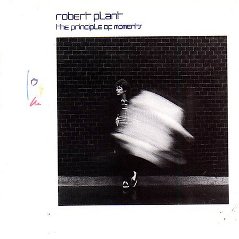Robert Plant – Principle Of Moments (1983)
Robert Plant – Principle Of Moments (1983)

01. Other Arms play 02. In The Mood 03. Messin’ With The Mekon 04. Wreckless Love 05. Thru’ With The Two Step 06. Horizontal Departure play 07. Stranger Here… Than Over There 08. Big Log Personnel * Robert Plant - vocals * Robbie Blunt - guitars * Paul Martinez - bass * Jezz Woodroffe - keyboards * Phil Collins - drums on 1-3, 5-6, 8 * Barriemore Barlow - drums on 4 & 7 * John David - backing vocals * Ray Martinez - backing vocals * Bob Mayo - guitars, keyboards, backing vocals on 9-11
Robert Plant's second solo outing shares more than a few things with its predecessor. It was recorded at the famous Welsh studio Rockfield and featured most of the Pictures at Eleven band, including a moonlighting Phil Collins on drums. As with Pictures, its production was as polished and clinical as the early Led Zeppelin sound was primal and thunderous.
But this time Plant managed a big hit – with Big Log – and promoted it with a clip for the now-essential televisual shop window that was MTV. He even performed the song on Top of the Pops, that biggest of Led Zeppelin no-nos.
Big Log was radically un-Zeppelin-like, a piningly slow song of aching love that combined ancient and modern – Roy Orbison with a drum machine. Robbie Blunt's Spanish-tinged guitar shapes sat somewhere between Ennio Morricone and Mark Knopfler as the drum machine clacked and Jezz Woodroffe's keyboard hummed sweetly in the distance. John David and Ray Martinez provided warm vocal harmonies.
Similarly low-key though far funkier was second single In the Mood, an invitation to dance and a hypnotic musing on the spell of music itself. Blunt's flaking fills again provided the track's melodic hook. Woodroffe's wafty keyboards were the star on the pretty, slow-dance Thru’ with the Two-Step. On all of these, Plant's vocals were striking for their mature restraint; but then he probably couldn't have belted out Immigrant Song in 1983 if he'd wanted to.
More strained and contrived as declarations of post-Zeppelin independence were the Indian-imbued Wreckless Love and the jerky sub-Police semi-reggae of Messin' with the Mekon. Stranger Here… Than Over Here is clunkily percussive, a melodically limp 80s experiment that fails to take off meaningfully.
The Principle of Moments got Plant back on the road for the first time since Zeppelin. Backed by the band that played on it – including Collins – he toured America on an old propeller plane through the summer and early fall of 83. Come November, he walked on to a British stage, at the Glasgow Apollo, for the first time since Zeppelin's Knebworth concerts in 1979. --- Barney Hoskyns, BBC Review
Tym albumem Robert Plant zdecydowanie rozpoczął palenie mostów za swoją przeszłością. "The Principle of Moments" to eksplorowanie zupełnie nowych muzycznych rejonów, tak bardzo odległych od bluesa i hard rocka, jak tylko było to możliwe. Plant tak mocno chciał się odciąć od uprawianej do tamtej pory stylistyki, że nie zamieścił na albumie dwóch najbardziej zeppelinowych utworów, jakie zostały nagrane podczas sesji: "Road to the Sun" i "Turnaround". Oba zostały wydane dopiero po wielu latach (pierwszy w 2003 roku na kompilacji "Sixty Six to Timbuktu", drugi cztery lata później na reedycji "The Principle of Moments"). Szkoda, ponieważ to naprawdę świetne utwory, które znacznie podniosłyby poziom tego longplaya, nadając mu więcej dynamiki i różnorodności.
Nie znaczy to bynajmniej, że na album całkowicie pozbawiony jest mocniejszych, rockowych utworów. Dynamicznego, cięższego grania na pewno nie brakuje w "Other Arms" i "Horizontal Departure". Jednak jedynie wokal Planta wywołuje zeppelinowe skojarzenia. Pod względem muzycznym utwory są wyraźnie osadzone w latach 80. - cechuje je charakterystyczne sterylne brzmienie gitar i perkusji, oraz duża rola syntezatorów. A to jeszcze nic przy tym, co otrzymujemy w pozostałych kompozycjach. Takie kawałki, jak "In the Mood", "Thru' with the Two Step" i zaskakująco pogodny "Stranger Here... Than Over There" to już czysty pop. W dwóch pierwszych w warstwie instrumentalnej zdecydowanie dominują syntezatory - gitara pełni w nich wyłącznie rolę ozdobnika (chociaż w "Thru' with the Two Step" znalazła się całkiem zgrabna solówka Robbiego Blunta). Nawet gdy w "Wreckless Love" pojawia się charakterystyczne dla Planta orientalizowanie, zostaje ono przeniesione na bardziej popowy grunt. A ciężki, bardzo zeppelinowy riff rozpoczynający "Messin' with the Mekon" to tylko zmyłka - później utwór dryfuje w zupełnie inne rejony, łącząc reggae'owe zwrotki z banalnym, popowym refrenem. Pojawia się tutaj też solo na syntezatorze - w 1983 roku brzmiące bardzo nowocześnie, dziś jednak będące tandetnym archaizmem.
Gdyby "The Principle of Moments" zawierał tylko utwory wymienione w powyższym akapicie, nie wahałbym się wystawić niskiej oceny. Jednak na album trafiła ponadto jedna naprawdę rewelacyjna kompozycja - finałowy "Big Log". To kolejny utwór o typowym dla popu lat 80. brzmieniu (czyste gitary, elektroniczna perkusja i syntezatorowe tło), ale prezentujący o wiele wyższy poziom. Plant udowodnił tutaj, że i w takiej stylistyce można stworzyć arcydzieło. To naprawdę zgrabnie ułożona kompozycja, a chwytliwy motyw gitarowy i przepiękna melodia należą do tych, które naprawdę ciężko zapomnieć. "Big Log" zupełnie zasłużenie stał się jednym z największych solowych przebojów Roberta.
Jeden utwór genialny, dwa dobre i reszta wywołująca co najmniej konsternację - trudno uznać taki album za bardzo udany. Jednak te lepsze fragmenty są wystarczającym powodem, aby nie lekceważyć "The Principle of Moments". ---Paweł Pałasz, pablosreviews.blogspot.com
download (mp3 @320 kbs):
Last Updated (Friday, 30 November 2018 09:28)








